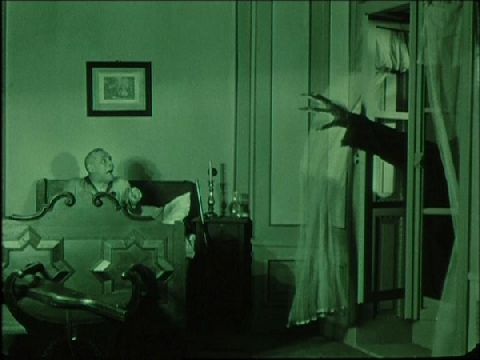Schloss Vogeloed (1921) 

Director: F. W. Murnau
Cast: Arnold Korff, Lulu Kyser-Korff, Lothar Mehnert
Synopsis: A nobleman at a remote castle attempts to prove that he did not commit a murder years earlier.
It’s incredible to think that just one year after directing this dreary mystery, famed German director F. W. Murnau would be chilling the world with his groundbreaking horror movie Nosferatu (1922). There’s none of that film’s wildly imaginative visual imagery here, and no clue, in fact, that Murnau was even capable of delivering such a masterpiece. Schloss Vogoloed is just about as stodgy as can be, with an achingly dull story that never once grabs the audience’s attention. According to IMDb, the original release was just 75 minutes long (which would be bad enough), but the recently restored German print — which really does look flawless — runs to 81 minutes. Which scenes have been added to that original version, it’s impossible to say because around 90% of the entire movie seems to be redundant.
The entire movie takes place in and around Vogelod Castle — as is confirmed from the numerous establishing shots of the stately home — the home of Lord and Lady Vogelschrey (Arnold Korff and Lulu Kyser-Korff). The Lord has invited a number of friends for a shooting party, but the weather has been unkind to his plans and so the guests are forced to kill time in the sumptuous castle. While they wait for the weather to clear, Vogelschrey receives a visit from Count Oetsch (Lothar Mehnert), a neighbour and former friend who is suspected of killing his own brother, even though he was never convicted of the crime. Oetsch is a little put out by the fact that he didn’t receive an invitation to the Lord’s hunting party and has decided to invite himself over his host’s objections. The reason Vogelschrey didn’t invite Oetsch is because he’s expecting the arrival of Oetsch’s former sister-in-law and widow of his murdered brother, Baronin Safferstat (Olga Tschechova) and her new husband, Baron Safferstat (Paul Bildt) at any moment.
The news of the Baronin’s imminent arrival cuts no ice with the imperious Count, and when she and her husband finally arrive she initially announces her intention to leave immediately. However, she changes her mind when she learns that Father Faramund (Victor Bluetner), a relative of her deceased husband, is also due to arrive at any moment. The father arrives while Oetsch is out hunting alone in the rain, and we see that he’s a monk of the old order, complete with plain brown tunic and tonsure. He also wears spectacles and sports a bushy beard. The baronin asks to see him immediately, and tells him of the early days of her marriage to Peter Oetsch. Those early days were idyllic, but Peter returned from a journey a changed man, believing that true happiness could be found only by renouncing all worldly goods. This obsession with goodness, the Baronin confesses, led to her yearning for evil — which is a bit of a stretch; I mean you could understand her wanting a bit of excitement back in her life, but a desire for evil requires a propensity for it that the Baronin simply doesn’t appear to possess.
Anyway, all this recalling the good/bad old days wears the out Baronin and she issues the Father with a ‘to be continued…’ notice. The problem is that before she can tell the rest of her tale the Father unaccountably disappears. Of course everyone immediately suspects Count Oetsch simply because they believe he’s got previous. However, in the face of further accusations, the Count rounds on the other guests and accuses the Baronin’s current husband of the murder of his brother.
Bored yet? Well I was by then, and was having real trouble keeping my eyes open for the gripping finale. The father’s disappearance doesn’t occur until the last third of the movie so most of the time prior to that is filled with exposition setting up the story for this final twist. Needless to say, things really drag, as the story plods along with no interest in providing any real depth to its characters or any intrigue to their exploits. The acting, particularly from the Baronin, is overly melodramatic, as if the actors are striving to enliven what they know to be a lifeless turkey. In the midst of all this dullness, Murnau inserts a couple of pointless dream sequences in a doomed attempt to spice things up, but they have nothing to do with the story and are experienced by minor characters who also have nothing to do with the story’s conclusion. It’s as if he too got bored with all the flavourless melodrama and simply filmed these scenes to keep himself amused.
(Reviewed 14th September 2013
httpv://www.youtube.com/watch?v=ynnNEEa7KK0
